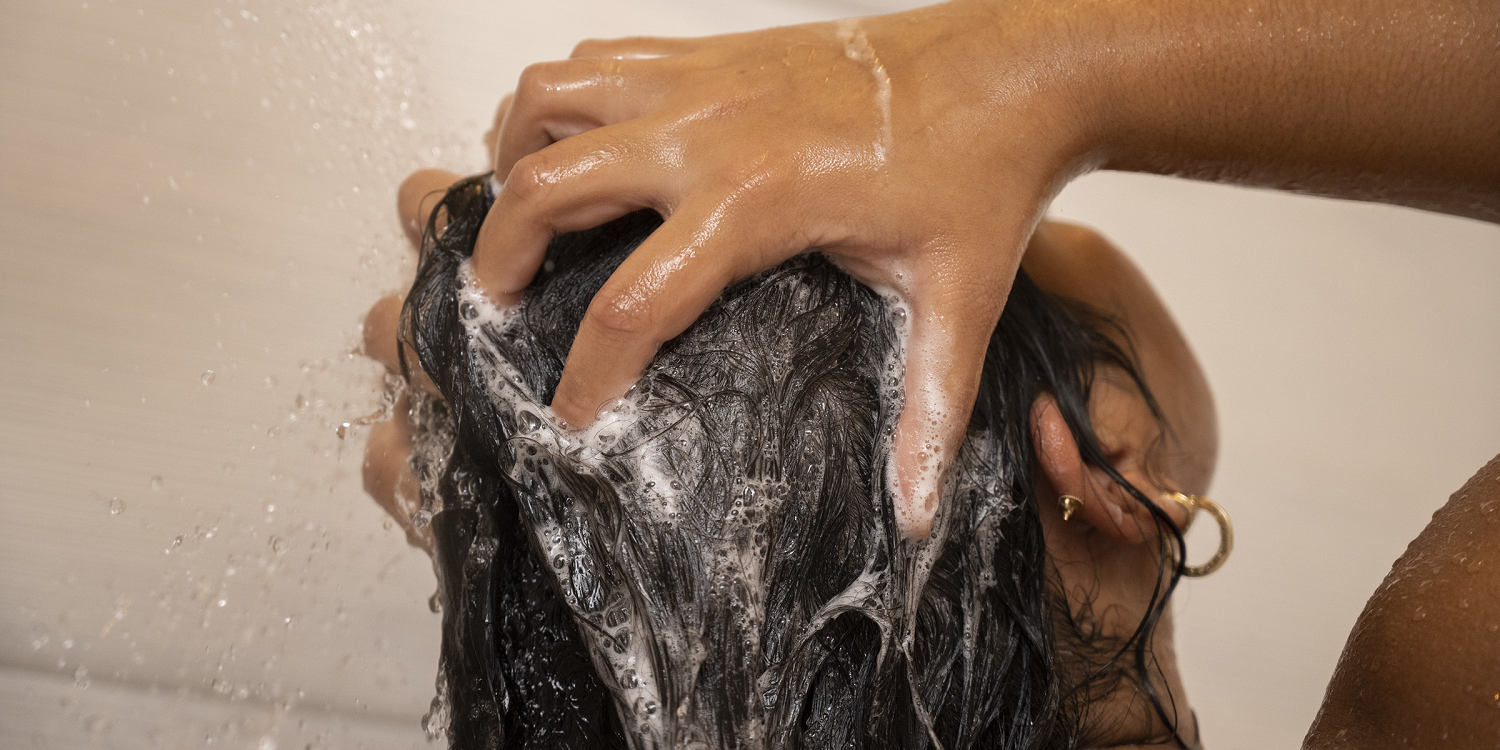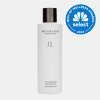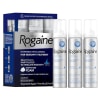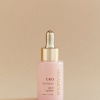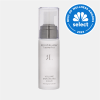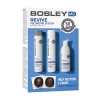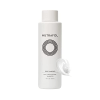Looking at the drain to see how much hair you’ve lost while taking a shower is the epitome of dread. While it’s common for the amount and thickness of hair to fluctuate over time (a person may lose between 50 and 100 strands per day), abrupt hair loss may indicate a medical issue. Pattern hair loss, regardless of the cause, is unpleasant for everyone and can lead to serious psychological problems for those who experience it.
Even though doctors believe that heredity is the cause of pattern hair loss, some products may be able to promote hair development and stop future hair loss. However, it’s important to determine the root cause of your hair loss before purchasing a “magic” elixir in a hurry. I discussed the reasons of hair loss and thinning hair with trichologists and dermatologists, as well as the best ways to treat thinning hair. Along with highly regarded goods with dermatologist-approved hair thickening formulae, I have collated professional recommendations for hair thickening shampoos, treatments, and other products.
GO Ahead and SkipHow to prevent hair loss, what causes thinning hair, how to treat thinning hair, and why should I trust NBC Select?
Selected.
How I picked the best thinning hair shampoos and treatments
According to the specialists I consulted, the cause of hair loss determines the most effective treatment for thinning hair. Our specialists suggest the following considerations to promote regrowth:
-
Ingredients that promote hair growth:
Minoxidil is proven to be the most effective treatment for promoting hair growth in men and women (more below). It is also the active ingredient in OTC products from brands like Rogaine and Minoxidil. -
Ingredients that keep hair healthy:
Beyond using minoxidil-based OTC treatments orprofessional treatments
at the dermatologist s office, the best one can do is use gentle, hydrating shampoos with ingredients like argan oil and glycerin.
Would you want more from NBC Select?Shop more wisely by subscribing to our newsletter, The Selection.
The best treatments and shampoos for thinning hair of 2024
I compiled a list of products that dermatologists and trichologists recommend to help maintain the health of your hair and encourage hair growth.
Best overall kit:
Nioxin System Kits
Nioxin Scalp + Hair Thickening System
Green’s patients love Nioxin’s System Kits, which include peppermint oil, niacinamide, and biotin to thicken hair. The System 1 kits target light thinning innatural hair, color-treated hair, and bleached hair. The kits, which comprise a therapeutic shampoo, conditioner, and scalp treatment, are designed to meet the specific needs of your hair. The System 2 kits are designed for advanced thinning and target the same hair types. Shampoos, conditioners, leave-in treatments, and other styling tools are all sold individually by Nioxin. Take into consideration the Nioxin Hair Regrowth Kit if you would rather use a hair growth treatment from the company that uses minoxidil.
Type of product: treatment, shampoo, and conditionerImportant components: minoxidil, biotin, niacinamide, and peppermint oil
Best thickening shampoo:
Revitalash Thickening Shampoo
RevitaLash Thickening Shampoo
The brand claims that this shampoo, which won the NBC Select Wellness Awards for best fine hair shampoo, can moisturize hair, exfoliate the scalp, increase hair volume, and improve strength. According to Revitalash, it is safe to use on color-treated hair because it is also free of parabens and oil. When applying, the manufacturer advises rubbing it into the scalp gently and letting it rest for up to two minutes before washing it off.
The NBC Select Wellness Awards
Type of product: ShampooImportant components: panthenol, willow bark, biotin, and loquat leaf
Editor s pick:
Vegamour Gro Hair Serum
Vegamour Gro Hair Serum
- Dropper application
- Non-greasy
- Strengthens hair
- For light thinning
- Pairs with Vegamour gummies
Since her days as a beauty editor, Lauren Swanson, the editorial director of NBC Select, has been a huge admirer of Vegamour. She describes herself as having a lot of fine hair. She claims that because she had to wear tight buns for hours while dancing ballet, she has thinner areas on her scalp. I saw increased hair density when I first started taking the gummies and using the Vegamour serum many years ago.
Type of product: serumImportant components: biotin, caffeine, and turmeric
Best topical foam:
Rogaine 5% Minoxidil Unscented Foam
Rogaine 5% Minoxidil Unscented Foam
- Easy to apply
- Stops early stages of thinning
- No scalp dryness
- Takes a while to see results
According to board-certified dermatologist Dr. Michele Green of New York City, Rogaine is likely one of the few products that has been licensed by the FDA and proven to aid in hair growth. Minoxidil, the active component in Rogaine treatments like this foam, promotes hair growth. Although the men’s and women’s foams both contain 5% minoxidil, Rogaine advises men to apply a half-capful twice daily directly to the area of the scalp where hair loss is occurring. The firm advises women to use half a capful only once every day. According to the brand, you can anticipate results in 120 days, but remember that sustained use is required to sustain results.
Type of product: foam | Main components: minoxidil
Best topical serum:
Rogaine 5% Minoxidil Solution
(6-month supply)
Rogaine 5% Minoxidil Solution – 4 Month Supply
- Helps hair regrowth
- Improves hair density
- Easy to apply with dropper
- May take a while to work
This topical minoxidil solution is available individually for men and women, just as Rogaine’s foam product. However, the women’s medication has only 2% minoxidil, making it less potent. The brand claims that after 120 days of consistent use, effects should be seen.
Type of product: serum; main components: minoxidil
Best with tea tree oil:
Avalon Organics Tea Tree Oil Shampoo
Avalon Organics Scalp Treatment Shampoo
- Soothes scalp irritation
- Softens hair
- Unscented
- Does not help hair growth
Although this Avalon Organics shampoo isn’t designed to promote hair development, it is a popular choice for Green’s patients with irritated scalps. According to our list of the best shampoos for head acne, several experts advise using products containing tea tree oil to relieve irritation. Our specialists say that tea tree oil has antimicrobial qualities as well.
Type of product: shampoo; main components: tea tree oil
Best for scalp health:
Nutrafol Root Purifier Shampoo
Nutrafol Root Purifier Shampoo
- Improves dry scalp
- Balances oil production
- Adds volume
- Does not help hair growth
Both King and Green advocate Nutrafol, a natural, drug-free shampoo brand that also produces oral supplements and other hair care items. Before taking any supplements, it might be prudent to speak with your doctor, but you could start by using the Root Purifier Shampoo. According to Swanson, who has previously used the shampoo, it hydrates the scalp without being too oily or causing her hair to feel heavy. According to the brand, the sulfate-free shampoo is made with mild cleansers like cocamidopropyl betaine that cleanse while balancing the pH levels of your scalp for healthier hair.
Type of product: Shampoo | Main components: Betaine
Best for volume:
Revitalash Volume Enhancing Foam
RevitaLash Volume Enhancing Foam
- Pump application
- Lightweight formula
- Targets specific sections
- Higher price point
According to Revitalash, this volume-enhancing foam, which won the NBC Select Wellness Awards for best hair treatment, is excellent for both wet and dry hair to avoid brittleness and breakage. Revitalash advises dividing your hair into sections and rubbing the product into your scalp and roots completely.
Type of product: FoamImportant components: biotin, lipids, peptides, and panthenol
Best hair growth system:
BosleyMD Revive Volumizing System
BosleyMD Revive Volumizing System
- Three-step system
- Prevents future thinning
- Not for color-treated hair
To lessen hair loss and thinning, use this three-step method every day, which consists of a shampoo, conditioner, and hair strengthening treatment. The brand claims that it uses botanical DHT inhibitors, such as rosemary extract, and is designed for non-color-treated hair.BosleyMD offers a wide range of thinning hair treatments, so you should be able to choose the one that works best for you.
Type of product: treatment, shampoo, and conditionerEssential components: extract from rosemary
Best hydrating:
Art Naturals Moroccan Argan Oil Shampoo
ArtNaturals Argan Oil & Keratin Shampoo
- Helps retain moisture
- Gentle formula
- Does not help hair growth
- Adds volume
This argan oil shampoo is a favorite among many of Green’s patients. Argan oil can help moisturize and keep moisture in dry hair. It is also an ingredient in NBC Select’s favorite clarifying shampoo. Additionally, Dr. Hadley King, a board-certified dermatologist in New York City who specializes in medical and cosmetic dermatology, says that the cleaner cocamidopropyl betaine is used in its formulation since it is a kinder substitute for harsh detergents and sulfates.
Type of product: ShampooImportant components: betaine and argan oil
Best for frizz:
Grown Alchemist Anti-Frizz Shampoo
Grown Alchemist Anti-Frizz Shampoo
- Prevents frizz
- Prevents heat damage
- Gentle formula
- Higher price point
- Does not lather
To make sure you are not making the issue worse, it is generally better to use a mild shampoo devoid of harsh substances, advises trichologist and hair health specialist Taylor Rose. She suggests this mild alternative from Grown Alchemist, which, according to the company, smoothes the hair follicle and shields it from heat damage.
Product type: Shampoo; main components: flavonoids and ginger
Related
A healthy scalp equals healthy hair. These products will help.
How to treat thinning hair
According to our specialists, identifying the underlying cause of hair loss is the best course of action when treating thinning hair. There is no magic button, says Green, but there are a few things that can help regrow hair, or at least protect the hair you still have.
-
Minoxidil:
Minoxidil is the most proven treatment for both men and women, according to King. Used in shampoos and popular products like Rogaine, it essentially widens the blood cells, allowing more oxygen, blood and nutrients to reach the follicles, she says. -
Argan oil and/or tea tree oil:
Argan oil is rich in fatty acids and will protect your hair, says Green. Plus, it can help your hair retain moisture. Green says many of her patients also like shampoos that contain tea tree oil, which has antimicrobial and antifungal properties that can soothe an irritated scalp. -
Glycerin-based styling products:
Glycerin-based products are also good for keeping the hair hydrated, says King. A hair care regimen that allows the protective layer or cuticle to remain intact as long as possible will decrease breakage, she says.
Products like shampoos and serums can be used in conjunction with oral medication and various dermatology treatments, likeplatelet-rich plasma injections(PRP) or prescription-only laser caps. Above all, topical therapies must stay on your head in order to be effective. It’s debatable how much of a benefit you get if you wash it in and out like you would with shampoo, according to Green. The most crucial component is concrete facts. There are many products out there that promise results that aren t backed by hard science, says King.
As for what else to avoid, look for shampoos free of harsh detergents, like Ammonium Lauryl Sulfate, Sodium Laureth Sulfate (SLES) and Sodium Lauryl Sulfate (SLS), according to Rose. Some alcohols may dehydrate the hair too: The ones to avoid usually have prop in their name, like isopropyl or propanol, she says.
What causes thinning hair?
The most common cause of hair loss is androgenetic alopecia, which is called male pattern or female pattern baldness, says Green. With this form ofhair loss, hair follicles shrink and eventually stop growing. In women, it presents as a gradually widening part. In men, pattern baldness usually brings a receding hairline or bald spot.
But there are other things that can cause hair loss too, like underlying medical issues or stress, says Green. She recommends paying attention to the nature of your hair loss: is it suddenly all over, or is it gradually thinning in the front? Take note of those symptoms and consult a doctor, who will likely request blood work to check if you re anemic, vitamin D deficient or if you have a thyroid disorder or autoimmune disease, according to Green. A lot of Green s patients are shocked to learn their hair loss is a symptom of something like lupus, or even a tumor in one bizarre case.
Or, a patient might havetelogen effluvium, a form of hair loss caused by stress to the body or mind. A loss of a loved one or job, a high fever, pregnancy or having surgery could all cause sudden hair loss.
Hairs are usually found at all different stages of the hair cycle, says King. But during an intense stress, the hair can become synchronized, leading many to fall out at the same time. The good news is that this kind of hair loss is reversible, says King. It does grow back. During the early stages of the pandemic, for example, many of Green s patients hair loss worsened, not necessarily from infection, but the stress of isolation. (You can learn more on the causes behind hair loss at this fact sheet from theAmerican Academy of Dermatology).
How to prevent hair loss
Frustratingly, genetics play a huge role in hair loss, but tackling the problem sooner rather than later can help: You ll want to stop it before it gets bad because once you lose your hair, and those hair follicles are dead, they re not growing back, says Green.
But you need not despair; there are multiple ways to stall the seemingly inevitable and some simple hair care tips and tricks to prevent hair loss in the first place:
-
A healthy lifestyle:
Practice habits that reduce stress and are good for your physical health, like meditation, yoga, journaling and eating a diet of whole foods, says Rose. Make sure you are eating enough protein in your diet, as hair is made up of protein, she says. Avoid alcohol and cigarettes as much as possible, too: They definitely weaken hair and they are just bad for you in general. No crash dieting either, says King. -
Protect your remaining hair:
Wearing a really tight bun day after day pulls on your hair and can cause permanent damage, says Green. So can frequent use of heated hair styling tools. A hair-care regimen that allows the protective layer, or cuticle, to remain intact for as long as possible will decrease breakage and drying out of the hair strands, says King. -
Use gentle fabrics:
Hair is very fragile when it s wet. Rose recommends using a microfiber towel after showering and sleeping on a satin pillowcase or in a satin bonnet.
If you notice your hair thinning, don t hesitate to see a specialist and advocate for yourself during your appointment. One of the most frustrating things is how many women get dismissed, says Green. Don t be afraid to speak up a good doctor will make time to chat and assess your unique situation.
Frequently asked questions
Losing your hair can be traumatic, so it s unsurprising that a wealth of hair growth oils have arrived on the scene. While minoxidil remains the most proven topical option for hair growth, there have been some noteworthy studies on the efficacy of various oils, like rosemary,pumpkin seed, castor oil or ginseng root (even two smaller tests conducted on mice have linkedlavender oilandpeppermint oilto hair growth), according to King. One2015 studycompared minoxidil and rosemary for hair growth, and both test groups saw significant increases in hair growth after six months.
While the studies indicate potential scientific advancements in the future, the data just isn t there yet: The bottom line is we need bigger, better studies in order to evaluate whether or not these ingredients help with hair growth, says King.
Rose, on the other hand, has seen real results amongst her clients who employ rosemary oil: It doesn’t really matter what brand of oil you use, as long as it is 100% pure rosemary essential oil, she says. If you give it a try, add five drops to your palm full of shampoo, massaging it into your scalp and letting it sit for three minutes before washing off, says Rose. Just don t add it directly to the bottle, she says.
Here at NBC Select, we recommend contacting a board-certified dermatologist or your general practitioner for more information about prescriptions and oral supplements.
If OTC options are not producing satisfactory results, ask your doctor about prescription options like spironolactone, finasteride and oral minoxidil, according to both King and Green.
Meet the experts
At NBC Select, we work with experts who have specialized knowledge and authority based on relevant training and/or experience. We also take steps to ensure that all expert advice and recommendations are made independently and with no undisclosed financial conflicts of interest.
-
Dr. Hadley King
is a board-certified dermatologist in New York City who specializes in medical and cosmetic dermatology.
-
Dr. Michele Green
is a board-certified dermatologist in New York City who specializes in cosmetic dermatology. -
Taylor Rose
is a hair health expert and trichologist who runs the
@thehealthyhur
TikTok account.
Why trust NBC Select?
Christina Colizzais a former editor at NBC Select and has been a product reviewer since 2018.
Catch up on NBC Select s in-depth coverage ofpersonal finance,tech and tools,wellnessand more, and follow us onFacebook,Instagram,TwitterandTikTokto stay up to date.
Note: Every piece of content is rigorously reviewed by our team of experienced writers and editors to ensure its accuracy. Our writers use credible sources and adhere to strict fact-checking protocols to verify all claims and data before publication. If an error is identified, we promptly correct it and strive for transparency in all updates, feel free to reach out to us via email. We appreciate your trust and support!
